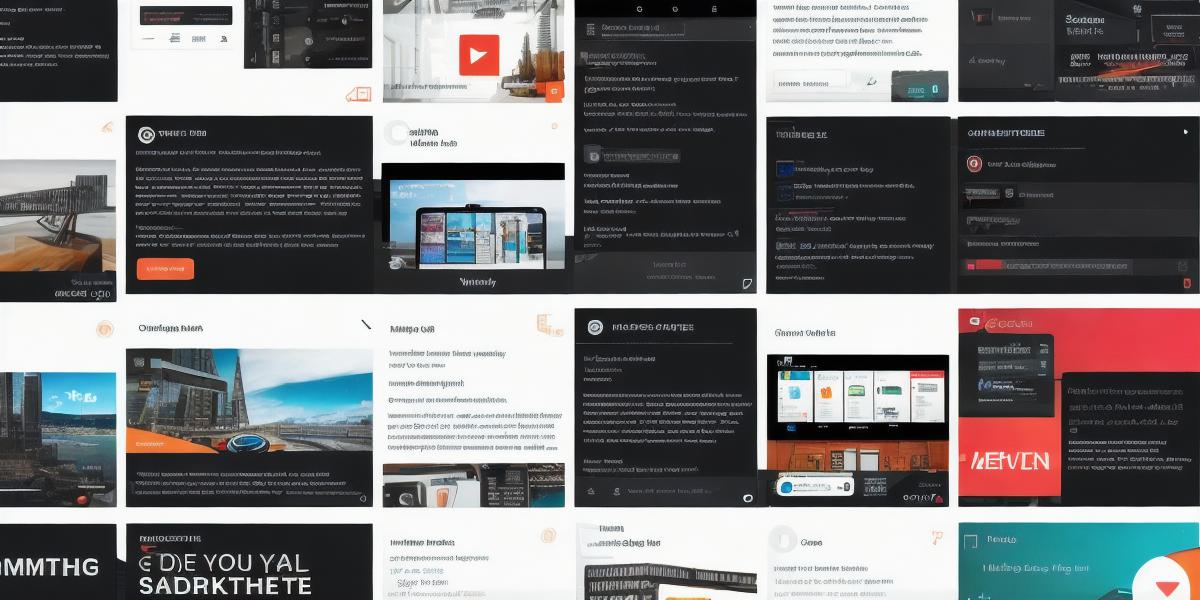In today’s digital age, it has become increasingly difficult for businesses to stand out from the competition. With millions of competitors vying for the attention of consumers, it can be challenging to create a unique brand identity that resonates with your target audience. However, there are several marketing tools available that can help businesses differentiate themselves and achieve success. In this article, we will explore some of the most effective and innovative marketing strategies that you can use to set your business apart from the competition.
1. Personalization: The Power of Customized Experiences
One of the key ways that businesses can differentiate themselves is by providing personalized experiences for their customers. By tailoring your products, services, and communications to the individual needs and preferences of each customer, you can create a more meaningful and engaging connection with them. This can be achieved through a variety of methods, including:
- Using data analytics and customer relationship management (CRM) software to track customer behavior and preferences
- Implementing targeted marketing campaigns that deliver personalized messages and offers based on a customer’s interests and history
- Creating customized product recommendations or upsells based on a customer’s previous purchases or browsing history
- Offering personalized customer service experiences, such as providing tailored advice or assistance based on a customer’s specific needs
By incorporating these strategies into your marketing mix, you can create more engaging and memorable experiences for your customers, which can help to build brand loyalty and drive repeat business.
2. Influencer Marketing: Leveraging the Power of Social Media Influencers
Another effective way to differentiate your business is by leveraging influencer marketing. By partnering with social media influencers who have a large following and influence within your target market, you can tap into their audience and reach new customers who may not be familiar with your brand. This can be achieved through a variety of methods, including:
- Sponsoring posts or stories on social media platforms like Instagram, Facebook, or TikTok
- Collaborating with influencers to create custom content that showcases your products or services in a unique and engaging way
- Offering exclusive discounts or promotions to influencer followers in exchange for promoting your brand
By using influencer marketing effectively, you can reach new audiences and build trust with potential customers by leveraging the power of social media influencers.

3. Gamification: Creating Fun and Engaging Experiences
Gamification is a powerful tool that businesses can use to engage their customers and differentiate themselves from the competition. By incorporating game-like elements into your marketing campaigns, you can create more fun and engaging experiences for your customers, which can help to build brand loyalty and drive repeat business. This can be achieved through a variety of methods, including:
- Creating interactive games or quizzes that are related to your products or services
- Offering rewards or incentives for completing challenges or achieving high scores
- Incorporating gamification into your social media or email campaigns to make them more engaging and interactive
By using gamification effectively, you can create a unique and memorable experience for your customers that will help to set your business apart from the competition.
4. Augmented Reality (AR) and Virtual Reality (VR): Immersive Experiences
Augmented reality (AR) and virtual reality (VR) are two cutting-edge technologies that businesses can use to create immersive experiences for their customers. By incorporating AR or VR into your marketing campaigns, you can create more engaging and memorable experiences for your customers, which can help to build brand loyalty and drive repeat business. This can be achieved through a variety of methods, including:
- Creating virtual product demonstrations or showrooms that allow customers to explore your products in a unique and interactive way
- Offering AR-enabled shopping experiences that allow customers to try on clothes or see how furniture would look in their home before making a purchase
- Incorporating AR or VR into your social media or email campaigns to make them more engaging and interactive
By using AR and VR effectively, you can create a unique and memorable experience for your customers that will help to set your business apart from the competition.
5. Artificial Intelligence (AI) and Machine Learning: Personalized Experiences
Artificial intelligence (AI) and machine learning are two rapidly evolving technologies that businesses can use to provide personalized experiences for their customers. By leveraging AI and machine learning, you can analyze customer data and behavior to create more targeted and relevant marketing campaigns, which can help to build brand loyalty and drive repeat business. This can be achieved through a variety of methods, including:
- Using chatbots or virtual assistants to provide personalized customer service experiences
- Implementing AI-powered recommendation engines that suggest products or services based on a customer’s previous purchases or browsing history
- Using predictive analytics to anticipate customer needs and preferences and deliver personalized offers or recommendations

By using AI and machine learning effectively, you can create more engaging and meaningful experiences for your customers that will help to set your business apart from the competition.
6. Experiential Marketing: Creating Memorable Moments
Experiential marketing is a powerful tool that businesses can use to differentiate themselves from the competition and build brand loyalty. By creating memorable moments for your customers, you can create a unique and emotional connection with them that will help to drive repeat business. This can be achieved through a variety of methods, including:
- Hosting events or experiences that are related to your products or services, such as product launches, workshops, or pop-up shops
- Creating immersive experiences that allow customers to explore your products or services in a unique and interactive way, such as product demos, tastings, or product trials
- Offering exclusive perks or benefits to loyal customers, such as early access to new products or personalized recommendations
By using experiential marketing effectively, you can create a unique and memorable experience for your customers that will help to set your business apart from the competition.
Case Studies: Real-Life Examples of Unique Marketing Tools in Action
To illustrate the effectiveness of these unique marketing tools, let’s take a look at some real-life examples of businesses that have successfully used them to differentiate themselves from the competition:
- Nike+ Run Club: Personalization and Gamification
Nike+ Run Club is a program that offers personalized coaching, training plans, and community events for runners. By using data analytics and machine learning algorithms, Nike+ Run Club provides customized recommendations based on each runner’s individual needs and preferences. This creates a more engaging and meaningful experience for runners, which helps to build brand loyalty and drive repeat business. Additionally, Nike+ Run Club incorporates gamification elements into its coaching and training plans, such as challenges and rewards, which makes the experience more fun and engaging for runners.
2. Coca-Cola: Influencer Marketing and Personalization
Coca-Cola is a global brand that has successfully used influencer marketing and personalization to differentiate itself from the competition. By partnering with social media influencers who have a large following and influence within its target market, Coca-Cola has been able to reach new audiences and build brand loyalty. Additionally, Coca-Cola uses data analytics and machine learning algorithms to provide personalized recommendations based on each customer’s individual needs and preferences, which creates a more engaging and meaningful experience for customers.
3. IKEA: Experiential Marketing and Personalization
IKEA is a furniture retailer that has successfully used experiential marketing and personalization to differentiate itself from the competition. By hosting events and experiences that are related to its products, such as product launches and workshops, IKEA creates a unique and memorable experience for customers. Additionally, IKEA uses data analytics and machine learning algorithms to provide personalized recommendations based on each customer’s individual needs and preferences, which creates a more engaging and meaningful experience for customers.
Conclusion: Unique Marketing Tools to Set Your Business Apart from the Competition
In conclusion, there are many unique marketing tools that businesses can use to differentiate themselves from the competition and build brand loyalty. By using personalization, gamification, AR/VR, AI/machine learning, experiential marketing, and other cutting-edge technologies, businesses can create more engaging and meaningful experiences for their customers. By taking a page from real-life examples like Nike+ Run Club, Coca-Cola, and IKEA, businesses can successfully use these unique marketing tools to set themselves apart from the competition and drive repeat business.




